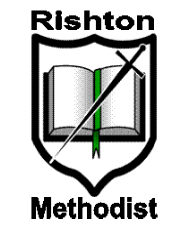Personal, Social, Health, Economics and Relationships
Our PSHE curriculum and a focus on positive physical, emotional and mental health and well-being is a key element of learning at Rishton Methodist Primary School. It starts with the very youngest children in EYFS when meeting their Personal, Social and Emotional Development needs. PSHE is recognised as a key subject area and is a high priority across whole-school initiatives, and our curriculum design has our children’s health, well-being and personal development at its heart. We use the scheme 'Jigsaw' to support the teaching of our PSHE curriculum, which includes Relationships, Health and Sex Education. In addition to PSHE and RSE lessons, all children have access to pastoral support to further demonstrate the importance of positive mental health.
PSHE will put in place the key building blocks of healthy, respectful relationships, focusing on family and friendships, both on and offline. This will sit alongside the essential understanding of how to be healthy emotionally, physically and mentally. Teaching about mental wellbeing is central to ensuring that pupils are well-prepared for the challenges which lie ahead in their lives. PSHE teaching will equip our pupils with the knowledge and capability to take care of themselves and to know how to get support if problems arise. The wider aim of this subject is to help foster pupil wellbeing and develop resilience and virtues that are fundamental to pupils being happy, successful and productive members of society.
It has been designed to meet the 2020 DfE statutory requirements for Relationship Education, Sex Education and Health Education, and is built around progressive units of work from the PSHE Association Primary Toolkit.
Our PSHE curriculum headings are built from our chosen scheme of work for Jigsaw:
- Being Me in My World
- Keeping Safe
- Celebrating Difference
- Healthy Me
- Relationships
- Changing Me
Each strand is delivered across all year groups for a half-term. Additional themes, such as information around career aspirations and economic wellbeing, are also addressed through focus days or organised events outside the classroom.
We also believe that through going beyond the statutory requirements with a broader curriculum, teaching on economic well-being, careers and enterprise education and the assessment and management of personal safety, our pupils are well-equipped to succeed in their future lives.
EYFS
The statutory framework for the Early years states that Personal, Social and Emotional development is one of the prime areas of development and is “particularly crucial for igniting children’s curiosity and enthusiasm for learning, and for building their capacity to learn, form relationships and thrive.“
It is defined as “helping children to develop a positive sense of themselves and others; to form positive relationships and develop respect for others; to develop social skills and learn how to manage their feelings; to understand appropriate behaviour in groups; and to have confidence in their own abilities“
Key Stage 1 and 2
In the National Curriculum, during key stage 1 and 2, LBS meets the statutory requirements from 2020 to teach relationships education. We believe that pupils should learn:
- How to grow and develop effective relationships with others
- To understand how to keep themselves safe from harm
- To be able to identify and manage risk
- To be able to keep themselves physically and emotionally healthy
This will be achieved through overarching teaching of knowledge with which they will be equipped to manage challenges in their lives.
Evidence and Assessment
This curriculum has the potential to have a profound and long-lasting impact on the future lives of our pupils. The structure links to a variety of curriculum areas, ensuring that the mainly skills-based PSHE curriculum helps to embed and build upon the knowledge learnt in other areas. The skills taught and practised aim to provide the foundation for a lifetime of positive relationships, physical and emotional wellbeing and the ability to play a key role as an effective citizen in the wider world. We look at how well our pupils get along together in our classrooms, playgrounds and whole school worship; on how effectively they manage disputes; on how caring they are to themselves and others. We look at how they understand positive relationships between themselves and others and in their understanding of how the academy helps to keep them safe.
Subject Leaders
Subject leaders will conduct deep dives, which include lesson drop ins, pupil interviews and book looks to measure the impact of our teaching, based on how much children can remember. Subject leaders will meet with their counterparts from our other trust schools and will moderate the work and monitoring outcomes from their setting to ensure that standards are exceeding the expectations.
